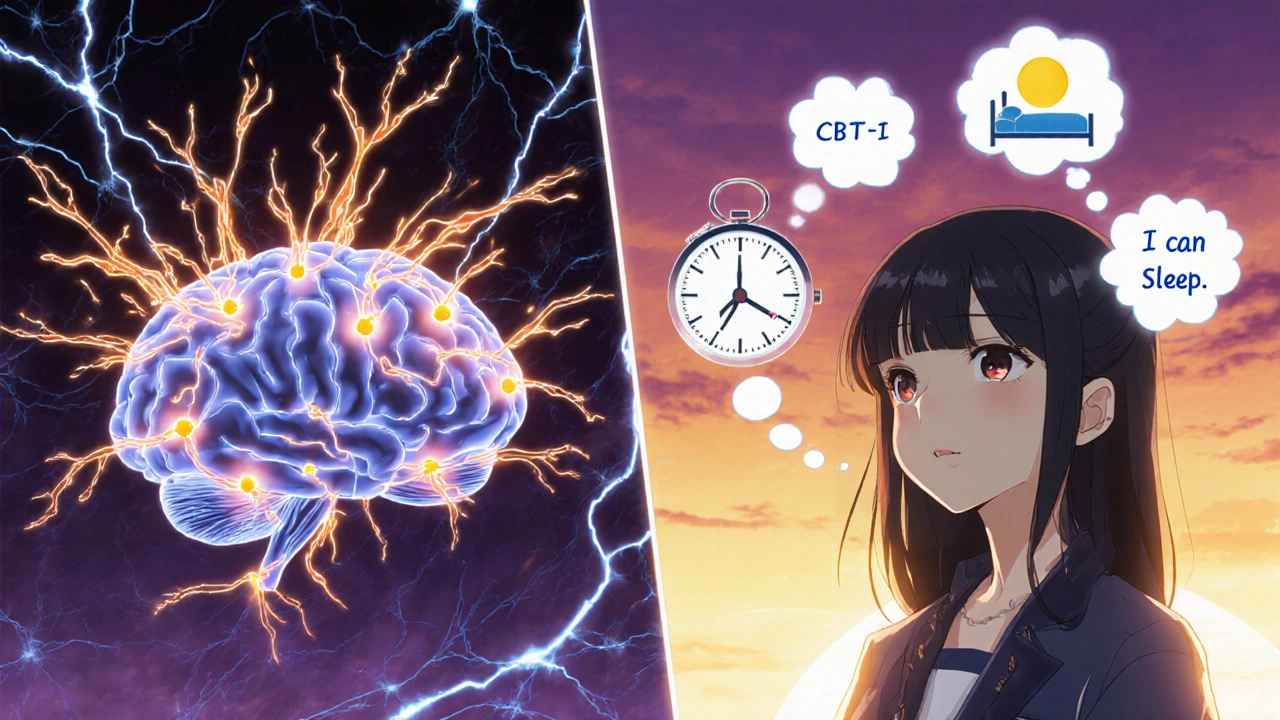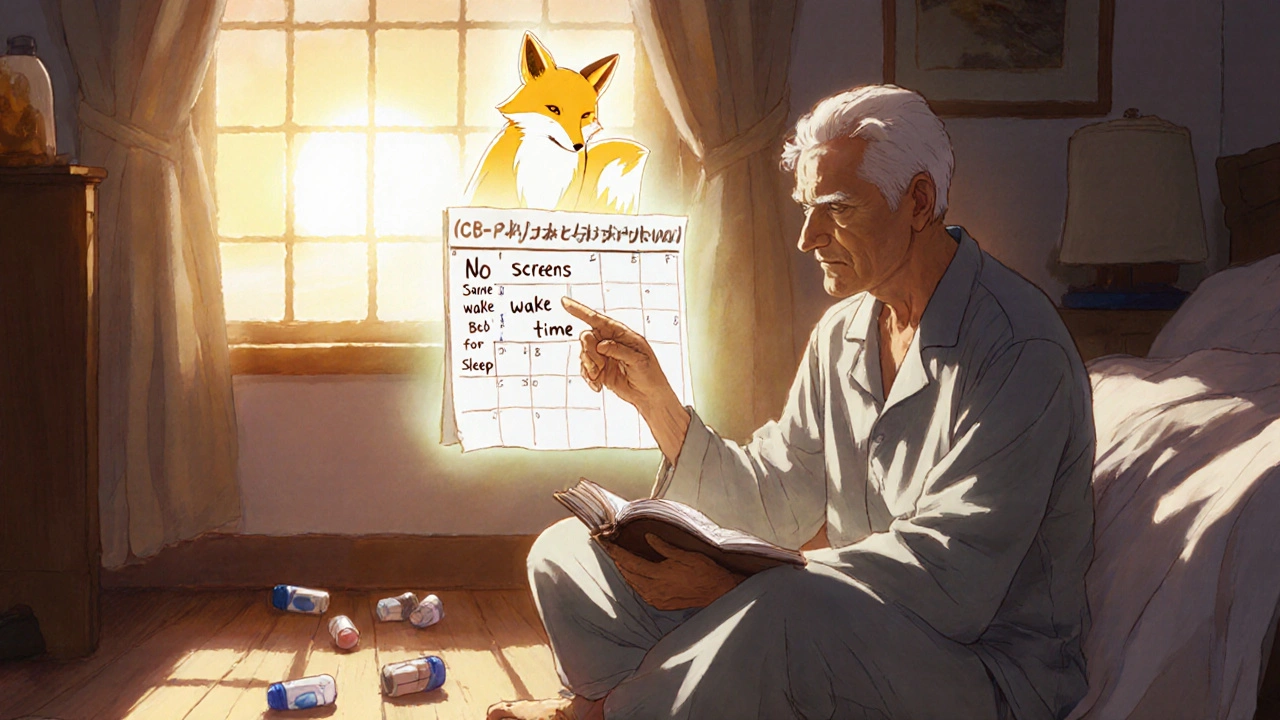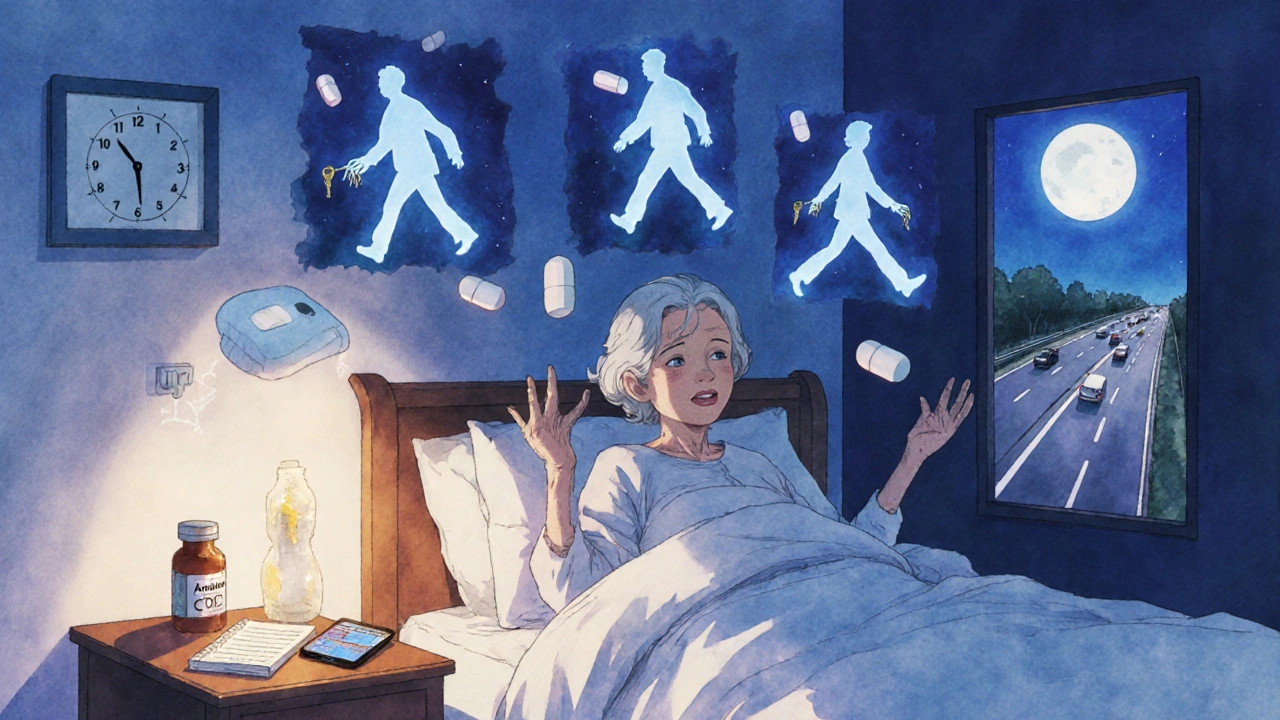More than 1 in 10 adults over 80 in the U.S. are taking prescription sleep pills every night. That’s not just common-it’s alarming. These drugs might help you fall asleep tonight, but what happens when you can’t sleep without them? And what’s really going on in your brain when you wake up feeling foggy, unsteady, or worse-like you have no memory of the night before?
How Sleep Medications Actually Work
Sleep medications don’t make you tired. They slow down your brain. Most of them target GABA, the brain’s main calming chemical. Benzodiazepines like lorazepam and non-benzodiazepine ‘Z-drugs’ like zolpidem (Ambien) and eszopiclone (Lunesta) do this by boosting GABA’s effect. The result? Faster sleep onset, fewer nighttime awakenings. But this isn’t natural sleep. It’s chemically induced sedation.
The FDA approved the first Z-drug, zolpidem, in 1992. At the time, it was marketed as safer than older benzodiazepines. But over time, the data showed something different. While Z-drugs may have slightly lower dependence rates than benzodiazepines, they carry unique dangers: sleepwalking, sleep-driving, and memory blackouts. In fact, the FDA issued a boxed warning for Ambien in 2019 after hundreds of reports of people driving while not fully awake-sometimes for miles-without remembering it.
The Hidden Dangers: Dependence and Withdrawal
Dependence doesn’t mean addiction. It means your body adapts. After just 2-3 weeks of nightly use, your brain starts needing the drug to function normally. When you stop, your nervous system goes into overdrive. That’s rebound insomnia: sleep worse than before you started.
Studies show up to 33% of people using benzodiazepines regularly for 4-6 weeks become dependent. Z-drugs are lower-around 5-10%-but still significant. And withdrawal isn’t just trouble sleeping. People report anxiety, tremors, nausea, even seizures in extreme cases. One Reddit user described quitting Ambien after six months: “I couldn’t sleep for three nights straight. My heart raced. I felt like I was dying. I went back on it.”
Doctors rarely warn patients about this. Most prescriptions are written for 7-14 days. But in practice, people keep refilling. Why? Because the fear of another sleepless night is stronger than the fear of dependence.
Who’s Most at Risk?
Older adults are the fastest-growing group using sleep meds. About 13% of people 80 and older take them. But the American Geriatrics Society says these drugs should be avoided in seniors. Why? Because the side effects are deadly.
Next-day drowsiness increases fall risk by 50-60%. Hip fractures in the elderly are often linked to sleep medication use. The risk isn’t just physical. Anticholinergic drugs-like the OTC sleep aids diphenhydramine (Benadryl) and doxylamine (Unisom)-are linked to a 54% higher risk of dementia after long-term use, according to JAMA Internal Medicine.
Women are also more vulnerable. The FDA lowered the recommended starting dose of zolpidem for women from 10mg to 5mg in 2019 because women metabolize it slower. That means higher levels stay in their system longer, increasing next-morning impairment. Studies show women are 50% more likely to use sleep meds than men.

What About Over-the-Counter Sleep Aids?
Many people turn to OTC options thinking they’re safer. They’re not.
Diphenhydramine and doxylamine are antihistamines. They cause dry mouth, blurred vision, constipation, and confusion-especially in older people. These are classic anticholinergic effects. And they build up over time. A 2015 study found people who used these daily for three years had a significantly higher risk of cognitive decline.
Melatonin is popular too. It’s not a sedative. It’s a hormone that signals nighttime. It can help reset your clock if you’re jet-lagged or have delayed sleep phase. But it doesn’t work for most types of chronic insomnia. And because it’s sold as a supplement, there’s no regulation. One 2021 study found that 71% of melatonin products on Amazon contained doses that were 100-470% higher than what was listed on the label.
The Real Solution: CBT-I
There’s a treatment that works better than any pill. It’s called Cognitive Behavioral Therapy for Insomnia, or CBT-I. It’s not a quick fix. It takes 4-8 weeks. But it lasts.
CBT-I doesn’t change your brain chemistry. It changes your habits. It teaches you to associate your bed with sleep only-not scrolling, worrying, or watching TV. It helps you reframe thoughts like “I’ll never sleep again.” It uses sleep restriction to rebuild your natural drive to sleep.
The evidence is overwhelming. Clinical trials show CBT-I helps 70-80% of people. That’s higher than any medication. And the benefits last for years. A 2023 review found that 78% of people who tried CBT-I had better long-term results than those who used sleep meds.
But here’s the catch: 65% of people find it hard to stick with at first. It’s uncomfortable. You’re told to stay out of bed until you’re sleepy. You’re asked to wake up at the same time every day-even if you got two hours of sleep. That’s hard. But it works.
New Alternatives: Digital Therapeutics and Emerging Drugs
The FDA approved the first digital CBT-I app, Somryst, in 2020. It’s prescription-only. You use it on your phone for 30 minutes a day, six days a week, for four weeks. In clinical trials, 60% of users achieved remission from insomnia. No pills. No side effects.
Newer medications are also emerging. Daridorexant (Quviviq), approved in 2022, blocks orexin-the brain’s wakefulness signal. Unlike Z-drugs, it doesn’t depress the whole nervous system. Clinical trials show less next-day drowsiness. The average residual impairment score was 2.1 out of 10, compared to 3.8 for zolpidem.
But these aren’t magic bullets. They’re still drugs. And they’re expensive. Quviviq costs over $500 a month without insurance. Somryst is covered by some insurers, but many still require prior authorization.

When Is a Sleep Medication Okay?
There are times when medication makes sense. Short-term use during a major life stressor-a divorce, a death, a hospital stay-can be helpful. If you’re severely sleep-deprived and at risk of accidents, a brief course might be necessary.
But it should always be paired with CBT-I. The American Academy of Sleep Medicine says pharmacological treatment should never be used alone. If your doctor prescribes a sleep pill without talking about behavioral therapy, ask why.
Also, never mix sleep meds with alcohol. The combination triples your risk of overdose. Even one drink can turn a safe dose into a dangerous one.
How to Safely Stop
If you’ve been on sleep meds for more than a few weeks, don’t quit cold turkey. That’s how rebound insomnia and withdrawal happen.
Work with your doctor to taper slowly. Cut your dose by 25% every two weeks. For example, if you take 10mg of zolpidem, go to 7.5mg for two weeks, then 5mg, then 2.5mg. Keep a sleep diary. Track how you feel each day. Use CBT-I techniques during this time.
One study found that 40% of people needed extra support during tapering-like counseling or short-term use of a non-habit-forming aid like trazodone. Don’t feel like you’re failing if you need help. You’re not weak. Your brain just adapted.
What to Do Next
Stop looking for the perfect pill. Start looking for the right habit.
- If you’re on sleep meds: Talk to your doctor about CBT-I. Ask for a referral or ask if your insurance covers Somryst.
- If you’re using OTC sleep aids: Replace them with a consistent bedtime routine. No screens 90 minutes before bed. Keep your room cool and dark. Get sunlight in the morning.
- If you’re struggling to sleep: Try a free CBT-I app like Sleepio or the CDC’s Sleep Well program. They’re not perfect, but they’re safer than pills.
Sleep isn’t something you take. It’s something you restore. And you don’t need a prescription to do it.
Are sleep medications addictive?
Yes, especially benzodiazepines and long-term use of Z-drugs like Ambien. Dependence can develop in as little as two weeks. Your body starts needing the drug to sleep normally. Stopping suddenly can cause rebound insomnia, anxiety, and even seizures. That’s why tapering under medical supervision is essential.
Can I take melatonin instead of prescription sleep meds?
Melatonin isn’t a sedative-it’s a timing signal. It helps if your internal clock is off, like with jet lag or shift work. But it won’t fix chronic insomnia caused by stress, anxiety, or poor habits. Also, many melatonin supplements are mislabeled. One study found most contain 100-470% more than the label says. Use it cautiously and only for short-term rhythm adjustment.
Why do I feel groggy in the morning after taking sleep meds?
That’s called residual impairment. The drug hasn’t fully cleared your system. Studies show it can be as strong as having a blood alcohol level of 0.05-0.08%-enough to impair driving and decision-making. This is why the FDA lowered the starting dose for women on zolpidem. It’s not just about feeling tired. It’s about safety.
Is CBT-I really better than medication?
Yes, and the evidence is clear. CBT-I has a 70-80% success rate for long-term insomnia relief. Medications work for a few weeks, then lose effectiveness. CBT-I teaches skills that last years. A 2023 review found 78% of people who tried CBT-I had better outcomes than those using sleep meds alone-even though many found it hard to stick with at first.
What are the safest sleep aids for older adults?
The American Geriatrics Society says no prescription sleep meds are safe for older adults. Even low doses increase fall and fracture risk by 50-60%. The safest approach is non-drug: fix your sleep schedule, reduce caffeine after noon, get morning sunlight, and use CBT-I. If you must use something, melatonin (in low doses) or doxepin (at 3mg or less) may be options-but only under close medical supervision.
Can I use sleep meds while taking antidepressants?
Some antidepressants like trazodone and doxepin are used off-label for sleep. But combining them with other sedatives increases risks: low blood pressure, confusion, irregular heartbeat, and respiratory depression. Always tell your doctor what you’re taking. Never mix sleep meds with alcohol or opioids. The combination can be fatal.
Next steps: If you’re currently using sleep medication, schedule a conversation with your doctor about tapering and CBT-I. If you’re not on meds but struggling to sleep, start with a free CBT-I resource. Your brain can relearn how to sleep-without a pill.


Jeremy S.
November 28, 2025 AT 17:56Been off Ambien for 8 months now. CBT-I sucked at first but now I sleep like a baby without anything. No fog. No crashes. Just peace.
Zack Harmon
November 28, 2025 AT 22:00THEY DON'T WANT YOU TO KNOW THIS BUT SLEEP PILLS ARE A SCAM DESIGNED BY BIG PHARMA TO KEEP YOU DEPENDENT AND DUMB. I WAS ON LORAZEPAM FOR 3 YEARS AND WENT THROUGH HELL TO QUIT. MY HEART WAS RACING, I THOUGHT I WAS DYING. NOW I USE A DUMB PHONE APP AND I'M FREE. THE SYSTEM IS BROKEN.
Jill Ann Hays
November 29, 2025 AT 09:46The pharmacological suppression of natural sleep architecture represents a profound epistemological failure in modern neurology. We have outsourced homeostasis to synthetic GABA agonists while abandoning the ontological responsibility of behavioral recalibration. CBT-I is not merely an alternative it is the only ontologically coherent solution.
Scott McKenzie
November 29, 2025 AT 20:22Just want to say thank you for this post. I was about to refill my zolpidem script until I read this. Started CBT-I last week using Sleepio. First week was brutal but day 8 I slept 6 hours straight. No pills. No guilt. 🙏
Jeremy Mattocks
December 1, 2025 AT 03:32I know a lot of people think CBT-I is just "sleep hygiene" but it's way deeper than that. It's about rewiring the anxiety loop that keeps your brain stuck in survival mode at night. The sleep restriction part? Brutal. Staying up until you're exhausted? Feels like torture. But here's the thing - when your body finally realizes the bed is only for sleep, not for stress or scrolling or staring at the ceiling, something clicks. It's like your brain remembers how to do its job again. And the best part? It doesn't wear off. I've been off meds for two years and my sleep is better now than it was before I ever took anything. If you're struggling, don't give up on the hard stuff. The easy fix is the trap.
Paul Baker
December 2, 2025 AT 04:48so i tried melatonin cause i thought it was safe but turns out my bottle had 15mg and the label said 3mg lol. woke up like a zombie. now i just drink chamomile tea and go to bed at the same time. no apps no pills just vibes 🌙
Mike Rothschild
December 3, 2025 AT 00:40For anyone thinking about quitting sleep meds - you're not weak for needing help. Your brain adapted to a chemical crutch. That's biology not failure. Taper slowly. Track your nights. Use CBT-I tools. And if you slip? Don't beat yourself up. Just reset. You're rebuilding a habit, not fixing a moral flaw. This is hard. But you're not alone.
Ron Prince
December 3, 2025 AT 16:40Why are we letting some app tell us how to sleep? Back in my day we just drank whiskey and passed out. Now we got woke doctors and fancy phone therapy. America is soft. Take a pill or take a punch. Either way stop whining.